Ambitious expansion effort will transform Music Hall into a downtown showstopper
In his office brightly crammed with a century’s worth of Detroit music memorabilia, Vince Paul has been dreaming up a grand vision for downtown.
Paul, a gregarious, Broadway-experienced arts executive who has run Music Hall for 17 years, isn’t usually the buttoned-up type. But for several years behind the scenes, he has been quietly spearheading a $123 million music complex that could transform the theater district in downtown Detroit’s northeast end.
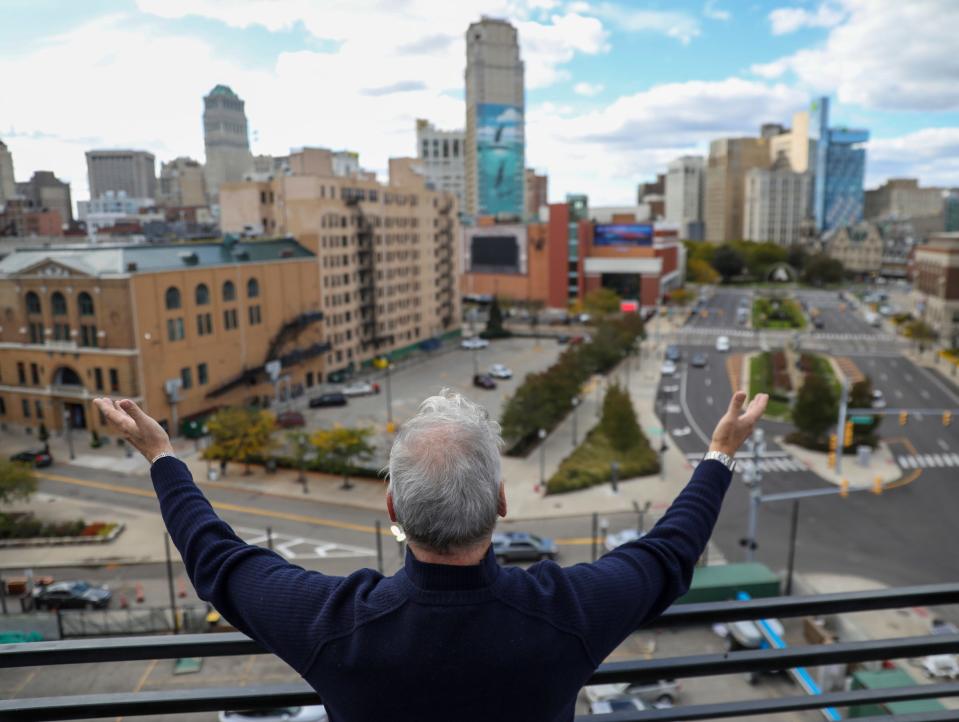
As currently planned, the seven-floor, 108,000-square-foot complex adjacent to Music Hall will include a 1,920-capacity concert venue, Detroit-music theme restaurant, walk-of-fame tourist attraction, rooftop club, music academy, recording studio, recital hall and more.
Designed by architect Tod Williams, a Detroit native whose recent projects include the Barack Obama Presidential Center and the rebuild of David Geffen Hall at New York’s Lincoln Center, the structure at Madison and Grand River would mark the most significant arts construction in Detroit since the expansion of Orchestra Hall in 2003.
Financing is still being hammered out but would include $80 million in tax-exempt bonds issued by the Economic Development Corp., whose parent authority, the Detroit Economic Growth Corp., launched the approval process in September. The nonprofit Music Hall would be responsible for repayment.
Paul said full funding plans, including $30 million in government grants and $10 million in private donations, will be announced “in coming weeks.”
Construction at the site, right now a parking lot purchased by Music Hall last year for $4.6 million, is tentatively scheduled to start in January. The targeted opening is October 2026.
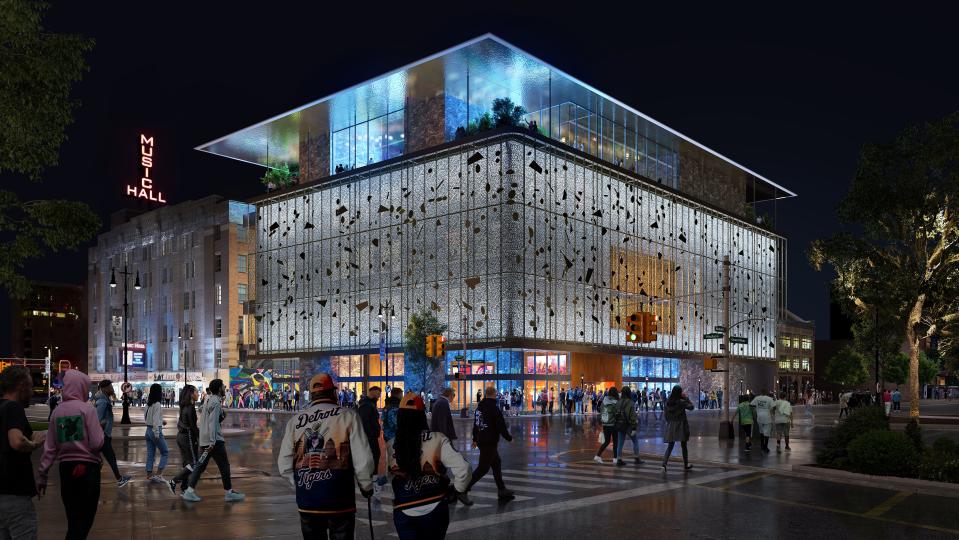
The project awaits a final go-ahead by the Detroit Historic District Commission, which approved most of the proposal last month while requesting a redesign of the building’s cantilever canopy and decorative exterior screen.
The overall vision is bold, ambitious and certainly impassioned. Paul, president of Music Hall since 2006, describes the planned expansion as “a shrine to Detroit music,” and he insists the concept is long overdue.
In private meetings with city leaders, corporate executives and philanthropists, his message has boiled down to this: For too long, Detroit has overlooked its vast music legacy — a rich and thriving heritage revered around the world.
For both tourism and the local economy, he said, that’s low-hanging fruit ripe to be grabbed.
“We’re a creative hub. I mean, is it really far-fetched to say we’re the music capital of the world? How come Nashville gets to say it? How come New Orleans? They don’t have half the credibility we’ve got,” Paul said. “I don’t look at ‘humble’ as an asset.”
Christopher Moyer, senior communications director with Visit Detroit, said the bureau is “looking forward to being a partner and helping see this project come to full fruition.”
“People in the region haven’t really appreciated how absolutely central Detroit is to America’s story and the world’s story, and music is one of those key components,” Moyer said. “Culture isn’t culture, music isn’t music, without Detroit. And finding a way to better celebrate that in one spot is crucial.”
The Motown Museum, 5 miles northwest, is in the final stage of its own $65 million expansion. That site — centered by Motown’s famed Hitsville, U.S.A. — is among the city’s most celebrated and high-profile tourist destinations, and Paul praises its significance as a cultural jewel.
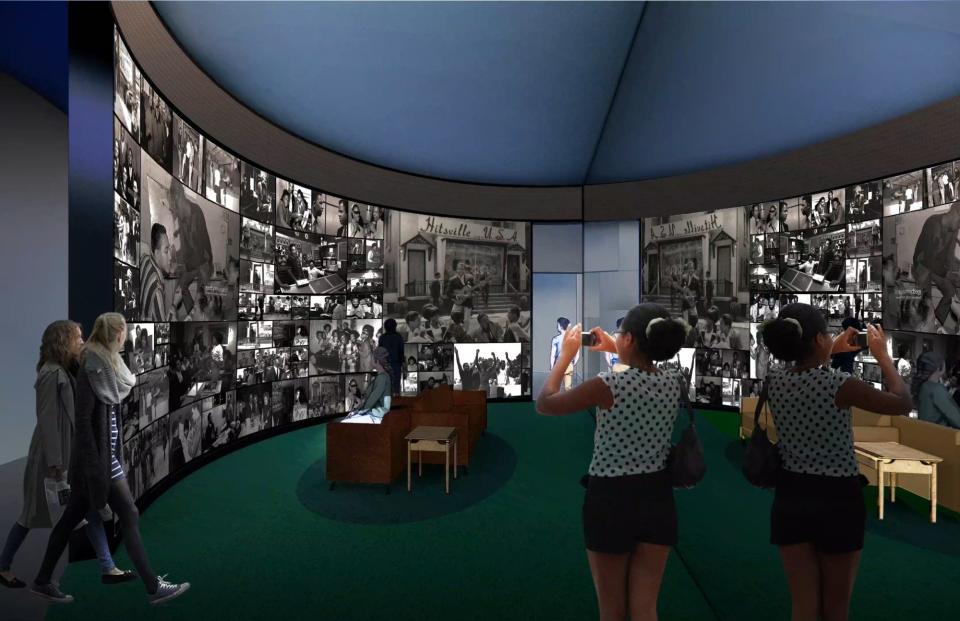
But there’s yet more to be celebrated, he said, and the Music Hall complex would concentrate “Detroit creativity into an easy, accessible display of our excellence. Tourists will love us for it. Locals will love us for it.”
A new “alley of the stars,” for instance, would be a two-block, high-tech walking attraction where visitors could customize their own exhibits of Detroit and Michigan greats: Aretha Franklin. Eminem. Bob Seger. Iggy Pop. The MC5. Anita Baker. Alice Cooper. Madonna. Not to mention the array of Motown stars: Diana Ross, Smokey Robinson, Stevie Wonder, Marvin Gaye, the Temptations, the Four Tops and more.
“It takes a dilapidated alley and turns it into something spectacular,” Paul said. “There's just something to be said about that — taking something that’s not good and making it into something great.”
The street-level restaurant would feature Detroit music memorabilia and themed dishes (Paul’s sample order: “I'll have the Diana Ross Salad with a side of Eminem Fries”).
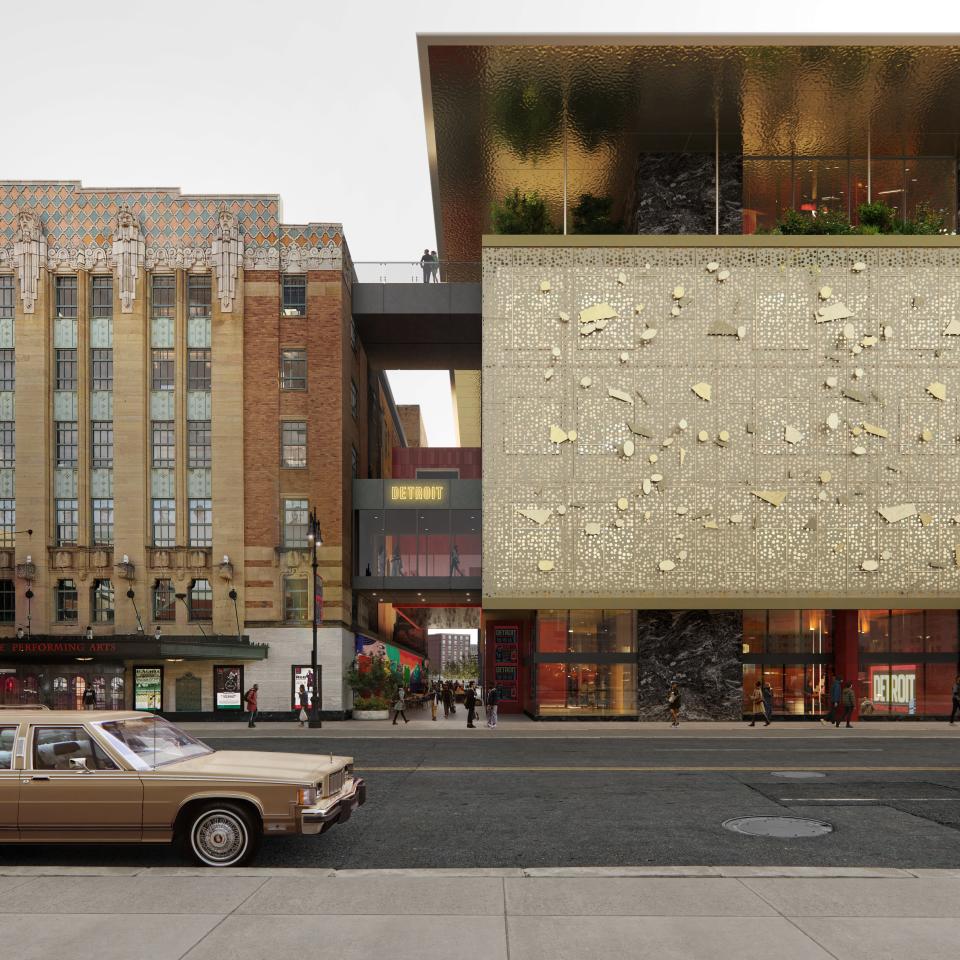
The 1,920-capacity concert venue — situated underground and reachable by a double-helix style stairwell — would include a 40-foot stage and a mezzanine with dedicated tables featuring bottle service in what Paul calls an “elevated experience.”
The concert hall, to be available for booking by outside promoters, could accommodate a variety of events, including rock shows, electronic dance music and comedy, he said.
Back at street level, plans call for a welcome center and ticketing portal where visitors can purchase passes for events and attractions across metro Detroit.
That would require cooperation among venues and promoters typically locked in a battle for guest attention.
“The success of this hinges on the community,” Paul conceded. “We’re taking a chance on everyone not seeing this as competitive. This is an altruistic building.”
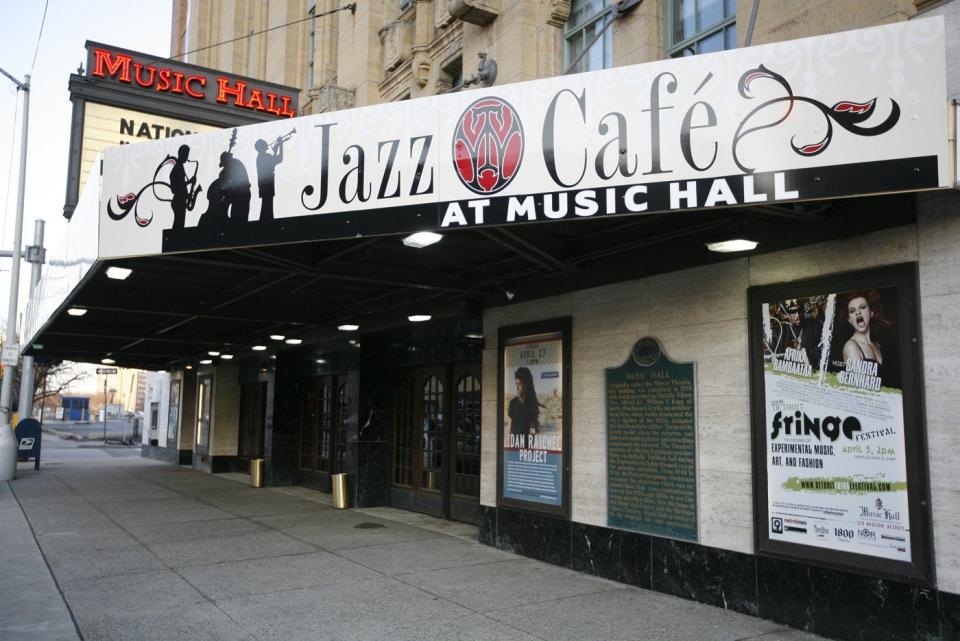
The new youth music academy would grow Music Hall’s existing instructor staff from nine to about 15. The focus now is on jazz, but the expanded program would encompass rock, R&B, electronic music and gospel.
The planned recording studio would include a central control room that includes a window into the 200-capacity recital hall, allowing the capture of live performances. That recital hall will sport its own window looking out across downtown — a design feature inspired by New York’s Jazz at Lincoln Center, Paul said.
Along with the third-floor office space, available for lease to music and arts companies, Paul sees the complex as an interlinked ecosystem: Each of the components, from the restaurant to the recording studio to the live venue, has its own business plan, he said.
A feasibility study conducted earlier this year by the New York firm Sweibel Arts projects the completed complex will create 446 new jobs, from ticketing staff to music instructors.
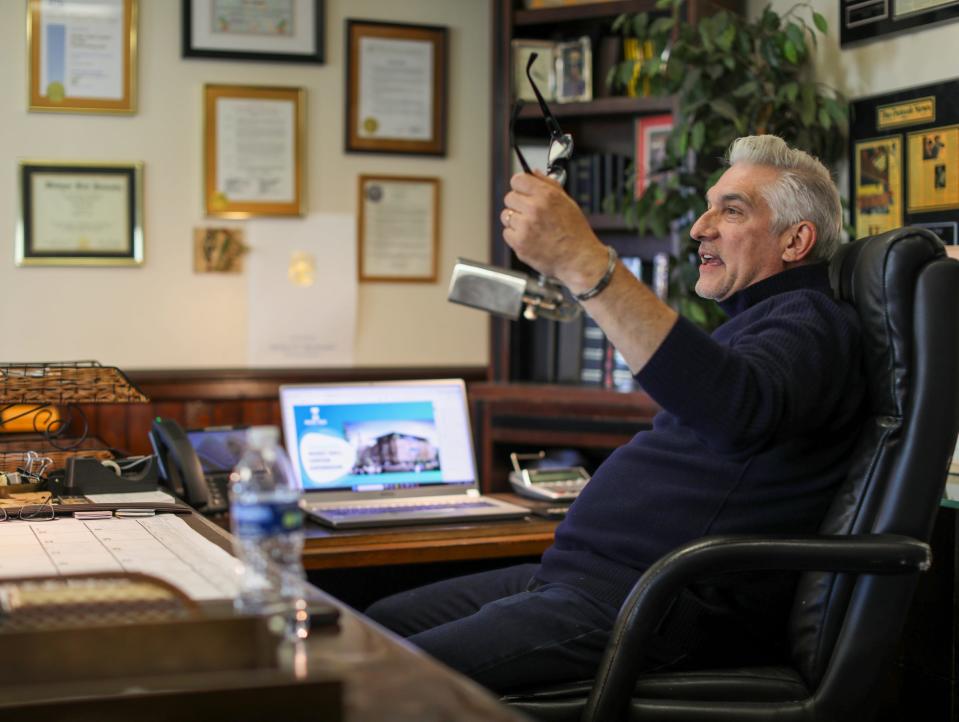
And while Paul expects much of the facility to be self-supporting, he said Music Hall must embark on raising "a war chest to prime the pump" on activities there.
“To do the mission, we have to raise money. We have to subsidize people that want to participate in it," he said, citing a pair of high-profile Detroit names: "You never know where the next Aretha's coming from. You never know where the next Jerry Bruckheimer is coming from.”
'Everyone's going to notice'
At the very least, the planned Music Hall expansion would help raise the identity of an often-overlooked 95-year-old venue that's tucked along Madison near the Detroit Athletic Club, Detroit Opera House and Gem Theatre, across from Comerica Park and Ford Field, and half a mile from Woodward concert venues such as the Fox Theatre and Fillmore.
These days, Music Hall’s 1,700-seat theater is supplemented by a downstairs space dubbed Aretha’s Jazz Café and a rooftop nightspot called 3Fifty Terrace. Inside the main hall, Paul touts the diversity of programming — from ballet to Broadway to R&B — including a regular series of rock and pop concerts presented by the Hollywood Casino at Greektown.
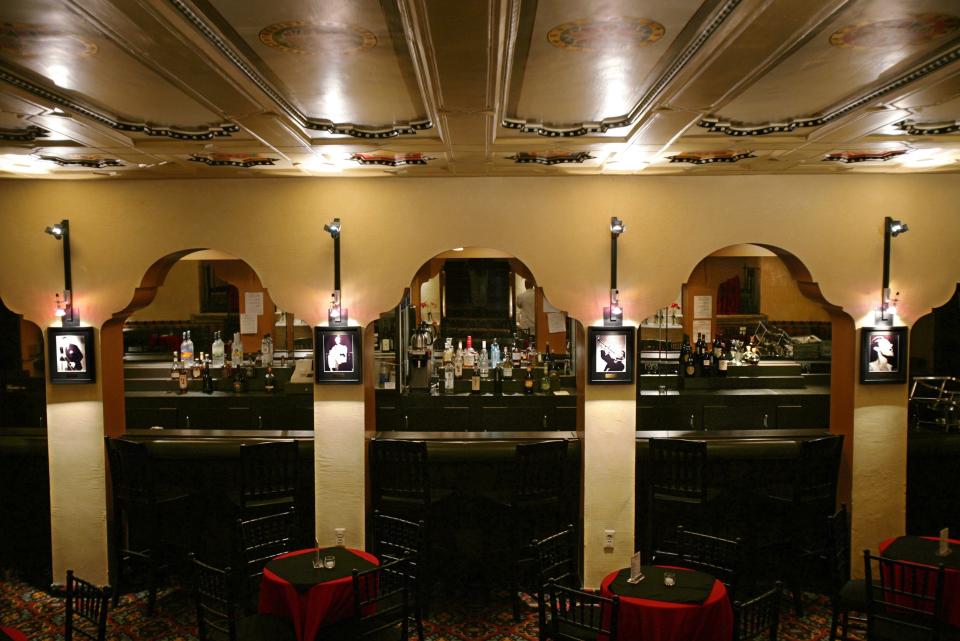
“People drive by it and they just don't really notice it, like we're not even there," Paul said. "You put this 21st-century masterpiece next to it, and everyone's going to notice the 1928 William Kapp architectural treasure. The new building will create awareness for the old building. You're honoring our history and you're honoring our future all in one block."
That structural synergy — the gleaming new building alongside the vintage art deco of Music Hall — is portrayed in new design renderings by the Amsterdam firm Plomp, published with this article.
In an operating budget unusual for a nonprofit performing arts center, Music Hall runs on about 70% earned revenue, including ticket sales, and 30% donations — a ratio roughly reverse from many similar institutions. The annual budget is about $14 million.
As things stand, the new building won’t have its own name. But its various components will, and Paul said Music Hall will lean hard into title sponsorships for regular revenue.
“I’m going to be naming doorknobs and urinals if I can,” he said.
More details are expected to be announced in coming months by Music Hall, where Paul is touting the expansion as an all-in community project.
“The only thing that’s going to move the needle (in Detroit) is to create a city that harnesses the talents, money and power of everybody working for a common cause," he said. "We’re carrying the same mission, the same concepts of unity, into this new building.”
And it's a quest that he hopes pays proper tribute to Detroit's musical past and future.
“Music is woven into our industry. It’s what we do. We’re going to build the infrastructure so we can keep the ball rolling on that legacy," he said. "We have an obligation to set the record straight. We’ve got to stop turning our backs on our stars.”
Contact Detroit Free Press music writer Brian McCollum: 313-223-4450 or bmccollum@freepress.com.
This article originally appeared on Detroit Free Press: Detroit's Music Hall to undergo ambitious $123 million expansion

